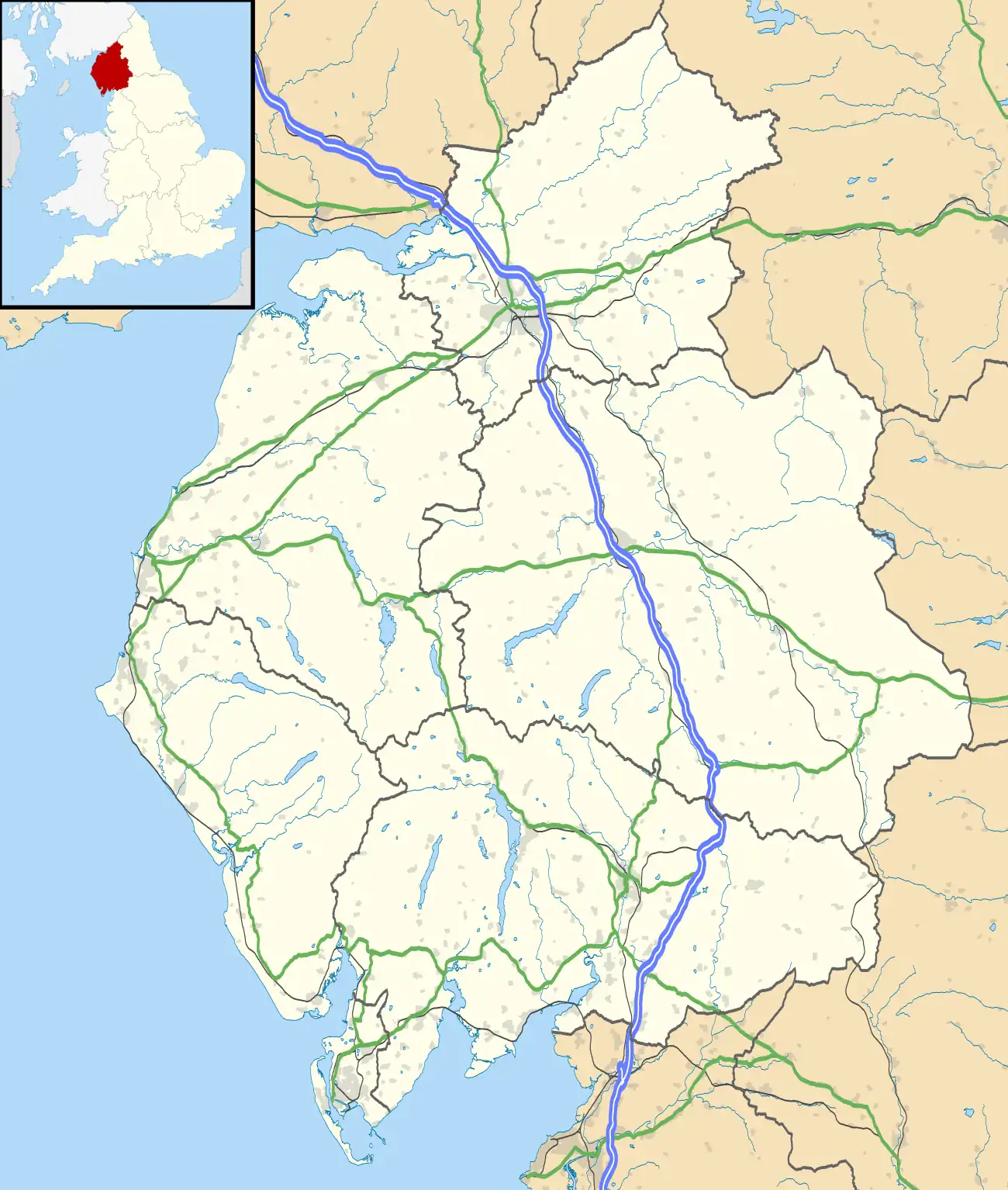| St Mary's Church, Penny Bridge | |
|---|---|
 St Mary's Church, Penny Bridge Location in Cumbria | |
| 54°14′04″N 3°03′33″W / 54.2345°N 3.0593°W | |
| Location | Penny Bridge, Egton with Newland, Cumbria |
| Country | England |
| Denomination | Anglican |
| Website | St Mary, Penny Bridge |
| History | |
| Status | Parish church |
| Dedication | Saint Mary the Virgin |
| Architecture | |
| Functional status | Active |
| Architect(s) | Miles Thompson, E. G. Paley |
| Architectural type | Church |
| Style | Gothic Revival |
| Specifications | |
| Materials | Slate rubble |
| Administration | |
| Province | York |
| Diocese | Carlisle |
| Archdeaconry | Westmorland with Furness |
| Deanery | Furness |
| Parish | Egton with Newland |
| Clergy | |
| Vicar(s) | Revd Brian Streeter |
St Mary's Church is on a site overlooking the villages of Penny Bridge and Greenodd, in the parish of Egton with Newland, Cumbria, England. It is an active Anglican parish church in the deanery of Furness, the archdeaconry of Westmorland with Furness, and the diocese of Carlisle. Its benefice is united with those of St Andrew, Coniston, St Luke, Torver, St Luke, Lowick, and Holy Trinity, Colton.[1]
History
The first church on the site was built before 1786.[2] It was a chapel of ease to Ulverston parish church. The church was built in roughcast stone; it was a long low building with a large west tower.[3] This church had round-headed windows.[2] A new, larger church was built in 1831.[3] The chancel was added in 1855–56, designed by Miles Thompson.[2] In 1864–65 the nave was rebuilt by the Lancaster architect E. G. Paley, and the south aisle was added. This work cost £1,000 (equivalent to £110,000 in 2021),[4] and was paid for by Countess Blücher von Wahlstadt.[5] A transept was added in about 1890. The tower was demolished in 1893, and a replacement designed by Frearson was erected in 1969.[2]
Architecture
The church is constructed in slate rubble, with red stone dressings.[2] The west front is rendered.[3] Its plan consists of a nave, a south aisle, a chancel, a south transept, with a tower at the northwest corner, and a west porch. The tower has a saddleback roof. Inside the church, the arches of the arcade are in brick. The carved wooden reredos dates from 1908. Also in the church is a painting of the Descent from the Cross. The stained glass is by William Wailes.[2] The two manual organ was built in 1866 by Wilkinson, and was moved from the west end to the chancel in 1890.[6] The lychgate is a First World War memorial.[3]
See also
References
- ↑ St Mary the Virgin, Egton-cum-Newland, Church of England, retrieved 10 January 2020
- 1 2 3 4 5 6 Hyde, Matthew; Pevsner, Nikolaus (2010) [1967], Cumbria, The Buildings of England, New Haven and London: Yale University Press, p. 341, ISBN 978-0-300-12663-1
- 1 2 3 4 Hockenhull, J. R., The Parish Church of St Mary the Virgin, Penny Bridge, Furness Family History Society, retrieved 27 August 2011
- ↑ UK Retail Price Index inflation figures are based on data from Clark, Gregory (2017). "The Annual RPI and Average Earnings for Britain, 1209 to Present (New Series)". MeasuringWorth. Retrieved 11 June 2022.
- ↑ Brandwood, Geoff; Austin, Tim; Hughes, John; Price, James (2012), The Architecture of Sharpe, Paley and Austin, Swindon: English Heritage, p. 221, ISBN 978-1-84802-049-8
- ↑ Lancashire (Cumbria), Penny Bridge, St. Mary the Virgin (D00924), British Institute of Organ Studies, retrieved 27 August 2011